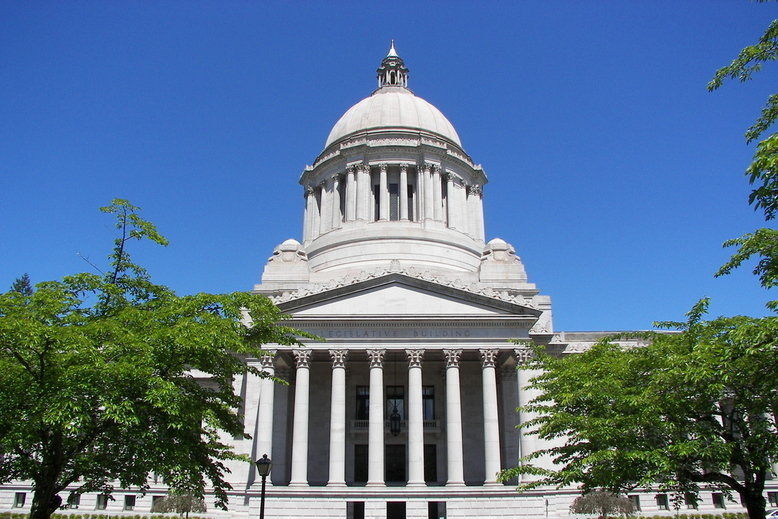Will the GOP Continue to Defy Conventional Wisdom?

Caffeinated News
1. The state senate Republicans—at least the ones on the transportation committee—appear to have defied conventional wisdom about the supposed crippling divide in their ranks between the Tea Party and the establishment. Last week's committee vote on the 11.7 cent, $15 billion gas tax transportation package had been a voice vote, so it wasn't clear until yesterday when the official minority and majority reports were released who voted how.
Sure it doesn't hurt that the package includes a major highway project that arch conservative state senator Michael Baumgartner (R-6, Spokane) wanted (US 395 North Spokane Corridor is the fourth biggest budget item on the project list at $861 million). But his yes vote along with six other Republicans (I'm counting state senator Tim Sheldon, D-35, Potlatch, as a GOP vote) seems to make it clear that the GOP is controlling the debate by being a disciplined party, apparently taking leverage away from the Democratic house as they attempt to amend the package to get rid of several GOP provisions like a rule against meeting prevailing wage standards and a mandate to shift all sales tax revenue on transportation projects out of the general fund and into the transportation budget.
If the GOP hadn't been able to pass a transportation package with its own votes, the Democrats would now have more muscle to bargain (there's also a provision against low-carbon fuel standards the Democrats don't like). But with the senate GOP presumably locked down behind a package, the Democrats are against the wall.
If they reject the package—currently it doesn't authorize full funding for Sound Transit either—the GOP can cast the Democrats as obstructionists.
Of course, the Republicans were cast as obstructionists last year when they stuck together and didn't support a Democratic transportation package, one that came with a greater percentage going toward transit (though still not much), didn't include all the antilabor and anti–clean energy Republican provisions, and didn't raid the toxic cleanup account.
Indeed, there's a lot for Democrats not to like about the current package. The question is: Will they stand together like the Republicans seem to be doing?
Three Democrats on the senate transportation committee voted against the bill, and three voted for it. And that brings me to an important footnote. You'll notice a lot of "presumablies" and "appear tos" and "seems" in my analysis. That's because one arch conservative Republican on the committee, state senator Don Benton (R-17, Vancouver), did vote against the package. And another arch conservative, state senator Doug Ericksen (R-42, Ferndale), ultimately didn't vote at all. With such a slim majority, every GOP vote still counts. If all three Democrats who voted for the package had voted against it in committee, it would have been a 7-7 split.
I've got a message in to the senate Republicans about Senator Ericksen's key vote. Presumably, Ericksen does like gas taxes for transit these days.
Transportation Choices Coalition has created a new group called Transportation for Washington that will do direct advocacy work by getting behind political candidates.
2. As the Cascade Bicycle Club considers dropping its 501(c)(4) status (and along with it, its ability to do full-fledged political advocacy work such as endorsing and spending money on candidates), another pro-transit group has started a 501(c)(4).
Transportation Choices Coalition, the group that coordinated the pro Metro funding measures, has created a separate group called Transportation for Washington that will do more direct advocacy work by getting behind political candidates. The group will be headed up by TCC's current policy director Andrew Austin, but will be a separate legal entity from TCC. Get-out-the-(youth)- vote group Washington Bus director Toby Crittenden and King County lobbyist (and former Metro funding campaign manager) April Putney are on the new group's board along with one current TCC board member, Brian Painley. While maintaining separate identities, the new group's bylaws do say that one-third of its board must also be TCC board members.
TCC is a 501(c)(3), and 501(c)(3)s can't back candidates. And while they can work on initiatives and lobby, those efforts cannot comprise more than 20 percent of their work. On the other hand 501(c)(4)s can back candidates and can spend up to 49 percent of their time on advocacy.
Glumly naming just a handful of transit advocates in the legislature, Austin tells me Transportation for Washington wants to focus on "getting more transit champions elected at the state and local level."
Of course, Austin's boss, TCC director Rob Johnson is currently running for local office; he's a candidate for the Fourth District in the current Seattle City Council cattle call.
Austin demurs about Johnson, laughing, "Do I personally think Johnson would be a great advocate for transit...? " but goes on to note other local "transit champions" such as Bellevue mayor Claudia Balducci who is running for King County Council in the Sixth District against Republican Jane Hague.
3. A bill to amend I-502, 2012's marijuana legalization law, is quietly making it through the Republican senate in Olympia.
The bill, which passed out of the commerce committee this month, would add churches to the list of places originally listed in 502 that pot stores cannot be near. I-502 said pot stores couldn't be located within 1,000 feet of elementary or secondary schools, playgrounds, rec centers, child care centers, public parks, public transit centers, or libraries.
There is no ban on liquor stores being near churches.
ACLU of Washington policy counsel Mark Cooke tells me:
The ACLU of Washington opposes SB 5450. The existing 1,000 ft restrictions already make it very difficult to site I-502 licensed businesses in densely populated cities. This bill would only increase the challenge of undermining the black market, which I-502 is intended to achieve. The bill's restriction on locations where "children regularly congregate" is also too vague. When compared to citing requirements for bars, I-502 has stronger protections. A bar can be located 500 ft from the "premises of any tax-supported public elementary or secondary school measured along the most direct route over or across established public walks, streets, or other public passageway from the main entrance of the school to the nearest public entrance of the premises proposed for license."
The Democratic minority report on the bill didn't oppose the legislation, it simply made no recommendation.



